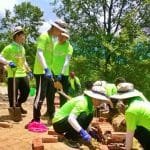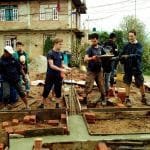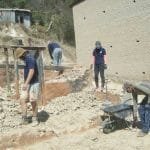
Disaster Risk Reduction Internship in Nepal
Get Hands-On Experience in Emergency Management and Risk Reduction
Join Volunteers Initiative Nepal (ViN) for a Disaster Risk Reduction internship and gain practical experience in emergency management, disaster relief, and climate change adaptation. This internship offers a unique opportunity to work on global DRR programs and humanitarian aid projects that aim to build resilience and prepare communities for disasters. Whether you’re a student or a recent graduate, this internship provides the perfect stepping stone for your career in disaster management.
- Hands-on experience in Disaster Management: At ViN, you’ll be directly involved in disaster risk reduction You’ll also work on community-based projects, giving you real-world experience in emergency response, crisis management, and humanitarian aid.
- Engage in Global Disaster Relief Projects: Nepal is one of the most disaster-prone countries, with frequent earthquakes, landslides, and floods. Your internship will allow you to contribute to disaster recovery efforts, climate change adaptation, and risk reduction This will provide invaluable insights into sustainable development and DRR opportunities worldwide.
- Cultural Immersion and Local Engagement: Experience the vibrant Nepali culture while working with local communities. ViN’s disaster risk reduction internship abroad programs allow you to understand the connection between climate resilience and disaster preparedness at the grassroots level.
Our Disaster Management Internship program gives you exposure to disaster risk reduction, humanitarian aid, and emergency management. Here’s what you’ll gain:
1. Work on Community-Based DRR Projects
- Disaster Risk Mapping
- Early Warning Systems
- Community Preparedness Programs
- DRR research and education
- Contribute to climate change adaptation efforts that help build community resilience.
2. Participate in Emergency Response Operations
- Be part of crisis response and disaster relief coordination.
- Gain experience in disaster recovery by supporting immediate aid and post-disaster assessments.
3. Learn Key Skills in Disaster Management
- Focus on earthquake preparedness, flood management, and landslide risk reduction.
- Understand sustainable development practices and DRR opportunities that improve resilience.
4. Expand Your Professional Network
- Connect with professionals in global DRR and humanitarian aid sectors.
Build relationships that can help you advance in disaster management and emergency response careers.
- Disaster Risk Reduction & Emergency Management: Gain firsthand experience in risk reduction, emergency response, and disaster preparedness. These are vital skills for a successful career in disaster management and global emergency internships.
- Communication and Teamwork: Working with diverse teams and local communities will enhance your communication and collaboration skills, which are vital in high-pressure environments.
- Problem-Solving and Adaptability: You will develop critical thinking and adaptability, enabling you to handle unexpected disaster management and emergency relief challenges.
This internship is perfect for the following:
- Students or graduates in disaster management, humanitarian aid, environmental science, or related fields.
- Those passionate about disaster relief, climate change adaptation, and humanitarian aid internships.
Individuals who want to build a career in emergency management, disaster risk reduction, and global disaster relief.
Your daily tasks will typically include:
- Disaster risk assessments and community outreach to promote preparedness.
- Planning and executing disaster response activities in communities if available that period.
- Attending workshops on disaster response and climate change adaptation.
You’ll also have the chance to explore Nepal’s natural beauty, including trekking in the Himalayas or visiting cultural landmarks like ancient temples.
Your involvement will directly support disaster risk reduction and humanitarian aid efforts. By helping build resilient communities, you’ll save lives and improve disaster preparedness. The skills you develop will help you succeed in global emergency response and humanitarian careers and open doors to international DRR programs.
1. What is a Disaster Management Internship?
A Disaster Management Internship involves projects focusing on disaster preparedness, disaster risk reduction, and emergency management. Interns help implement disaster relief strategies and gain real-world experience in crisis management.
2. Do I need prior experience?
No prior experience is necessary! We welcome applicants eager to learn about disaster risk reduction, humanitarian aid, and climate change adaptation.
3. Are internships paid?
These internships are unpaid. However, the program fees cover your accommodation, meals, and other essential costs, so you can focus on gaining valuable experience. Learn more here about the program fees https://www.volunteersinitiativenepal.org/affordable-volunteer-program-fees/
4. How long are the internships?
Internships range from four weeks to six months, depending on your availability.
5. Will I be involved in disaster response?
Yes! You’ll actively participate in disaster relief and emergency response activities, gaining firsthand experience in immediate relief and long-term recovery if you come during the disaster.
6. How do I apply?
Submit your application through our website. Include your resume and a motivation letter, and we’ll guide you through the following steps.
- Submit Your Application: Complete the online form with your resume and motivation letter.
- Get Matched: We’ll match you with the program that best suits your skills and interests.
- Confirm & Pay: Confirm your placement and pay the application fee.
- Pre-Departure Support: Receive pre-departure assistance and orientation materials.
- Begin Your Internship: After arriving in Nepal, you’ll attend a 2-3 day orientation before starting your internship.
- Affordable Fees: ViN offers competitive pricing, ensuring that you get great value for your experience.
- Community-Focused Projects: Our projects are designed to have a lasting impact on vulnerable communities.
- Ethical Practices: ViN is firmly committed to moral principles, ensuring your efforts make a real difference.
“This internship gave me real-world experience in emergency management. I now feel confident pursuing a career in humanitarian aid internships.”
— John D., Disaster Management Intern, USA
“I learned much about climate change adaptation and its connection to disaster risk reduction in vulnerable communities of Okhaldhunga. It was an unforgettable experience.”
— Alice M., Emergency Management Intern, UK
Email at support@vin.org.np or WhatsApp at
Office Hours
Monday – Friday: 9:00 AM to 6:00 PM (Nepal Time)
Apply Now to start your Disaster Risk Reduction Internship in Nepal and take the first step toward a meaningful career in emergency management!
Requirements
- Gender: Female / Male
- Minimum Age: 18+ years (16-17 years old person can volunteer but need to present parents’/ guardian’s consent letter)
- Language:English (Intermediate)
- Educational:High School Graduate
Your Experience/ Setting
Upon your arrival at Kathmandu Tribhuvan International Airport (TIA), you will receive a warm welcome and be transported to your hotel or hostel. If you are already in Nepal before the start of your placement, we can make alternative arrangements for you. You will undergo a comprehensive two- to three-day induction program after arrival. This induction will provide valuable information about your project and general information about the Nepalese language, culture, health, safety, and security. It is also an excellent opportunity to connect with fellow volunteers and interns who can become your companions for sightseeing and a source of support throughout your volunteer placement.
During the induction period, you will be accommodated in a budget hotel or hostel arranged by VIN. However, most of the VIN experience involves living with a Nepalese host family. While this immersion is essential for a complete experience, we understand that it can be challenging as you adapt to a new culture and adjust to facilities that may be more basic than you are accustomed to. Don’t worry; all our host families have experience accommodating volunteers, although their English-speaking abilities may vary. Also, you will have 24-hour access to our staff members for support and assistance throughout your placement.
Volunteers will be assigned to one of VIN’s working areas, which include Tarakeshor Municipality in Kathmandu, Taluwa, Thulachhap, and Bhadaure in Okhaldhunga, and Okharpouwa and Kaule in the Nuwakot district. While at the working site, volunteers are requested to bring their lunch box, water bottle, safety gear, face mask, and any other essential belongings. We advise volunteers to dress comfortably and modestly, preferably with long sleeves. Please get in touch with us for guidance and support if you want to raise project funds or collect project-specific resources. This will help the community a lot.
Schedule and Commitment
You will work five to six days a week, up to six hours per day. You may propose your preferred time and hours; however, the working time period will be dependent on the institution you have been placed. A minimum of 2 weeks’ time commitment is expected of a volunteer. The longer you commit; the better impact you can make. You should be willing to commit a certain amount of your free time and energy, show a lot of commitment and be a good listener. You are expected to work constructively and co-operatively maintaining good reputation and standards at all times. Volunteer should abide by relevant security concerns and access procedures. Moreover, you should be receptive and positive to performance appraisal, advice and feedback. Throughout your placement, you will have the full support of VIN. Your safety is our highest priority.
Your typical day might look like this:
| 07:00-08:00 | Tea/Leisure Time |
| 08:00-09:00 | Breakfast/Brunch (Nepali meal – Daal-Bhaat) |
| 09:00-10:00 | Preparation for sessions |
| 10:00-13:00 | Deliver training sessions/Workshops |
| 13:00-14:00 | Lunch (Packed lunch) |
| 15:00-17:00 | Deliver interactive sessions for youth clubs |
| 17:00-20:00 | Preparation for next day/Leisure time |
| 20:00-21:00 | Dinner (Nepali meal – Daal-Bhaat |
You will receive a clear and concise on-the-job instructions, course of action, context of work and policies/strategies before your placement begins. You will be provided with ample of guidance and support throughout the placement with trainings / onboarding sessions incase necessary. You will be in a constant communication and regular check-in with the VIN volunteer coordinator. VIN aims to maintain a culture of continuous feedback between the volunteer supervisor at the placement to monitor the performance of the volunteer and ensure the project delivers desired outcomes.
In case of an emergency, you may contact one of our Volunteer Coordinators who will be available anytime for your assistance and support.
Click here to Learn more on how volunteering works
Mid and Long Term Volunteers:
2 weeks minimum stay- € 380
3 weeks – 480€
4 weeks – 580€ (after 4th week, for each additional week €95)
University Internships:
4 weeks minimum stay- € 680 (for each additional week – €105
Click here to Learn what’s included and excluded in our Fees Section
Click here to Learn recruitment process on how volunteering works
Our projects are open year-round, and our inductions begin on the first and third Mondays of each month. We would like to ask that volunteers arrive one day before the start of the induction. You can choose the duration of your participation based on your available time. However, so that you know, our volunteering placements are limited. We highly recommend booking your placement in advance to secure your placement. Click here to apply.







 Member of
Member of